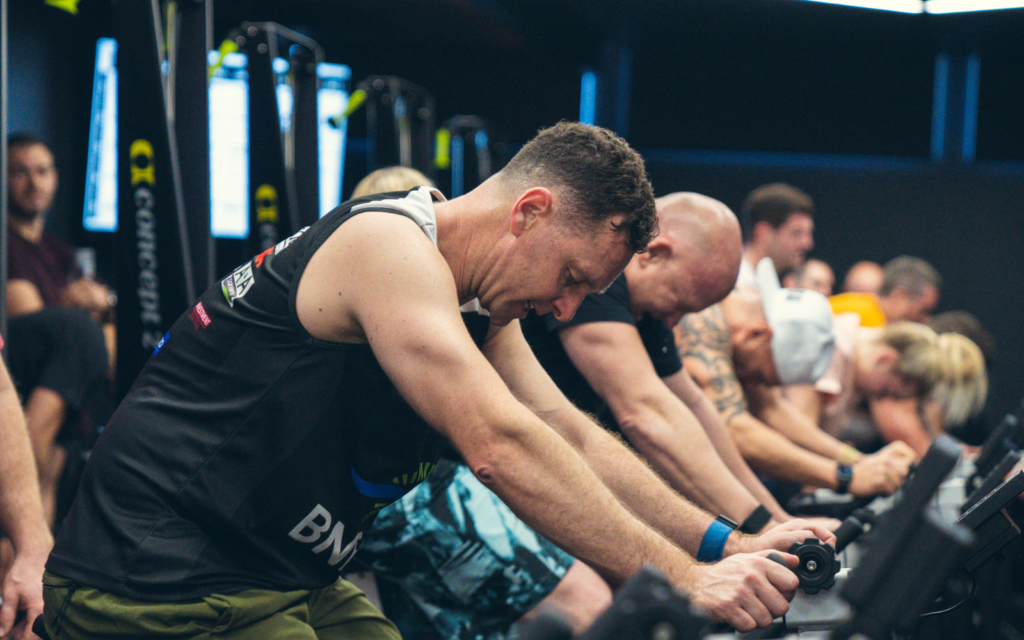Dry Tri Preparation Program
Estimating the Lactate Threshold
This method requires a 30-minute time trial at a sustained high intensity. The main goal here is to find the highest effort that you can sustain and monitor your heart rate throughout the test. This test can be done on any cardio machine or modality of your choosing – be that a run, swim, cycle, ski, or row. My recommendation would be a cycle as this is low impact and easy to replicate for retesting.
You will need:
- Concept 2 bike erg /ski erg / row erg / assault runner / treadmill
- Heart rate monitor
- Stopwatch (or other device for tracking time intervals)
Method:
- Warm up: Raise HR to 60-70% Hrmax through cardio of your choice + hamstring/quad/glute foam rolling/trigger point + Dynamic hip flexor & hamstring stretches.
- Begin your test and work up to your maximum intensity within the first 10 minutes (use this time to guestimate what you will be capable of maintaining for the duration of the test – do not go all out straight away)
- Record your heart rate each minute for the next 20 minutes of the test
- Calculate your average heart rate over the FINAL 20 minutes of the test. This measurement is your estimated heart rate at your lactate threshold
- Cool down: Static stretching
Weekly Program Breakdown
Monday: Strength Day 1 + POWER Sprints finisher
Tuesday: METCON or rest/recovery
Wednesday: Anaerobic Threshold Session
Thursday: METCON or rest/recovery
Friday: Strength Day 2 + POWER Sprints finisher
Saturday: METCON or rest/recovery
Sunday: Anaerobic Threshold Session or rest/recovery
Structural Balance Strength Training
The purpose of these two strength sessions is to improve the muscular endurance and overall structural balance of the body to prevent injury & increase endurance for the Dry Tri. Each exercise in these two workouts have been specifically chosen to target the key muscles that will be used in the Dry Tri – namely glutes, hamstring, quads, calves, anterior ankle muscles, core & shoulders/upper back. Each exercise should be completed at an intensity of 80/20 – meaning you reserve 20% effort or at least 2 reps after each exercise to ensure you have enough energy to complete the total number of reps and rounds of the circuit with good form.
Day 1:
Warm up: 2 min SKI -> 30s each side Forward Leg swing -> 30s each side Lateral Leg swing -> 30s hollow body hold
Circuit of 3-5 rounds:
10-20 reps Stability ball (or Sliders) hamstring curl
5-10 reps each side Lateral Lunge
20 reps Body Weight Calf Raises
10 each side Walking Lunges
20 reps Plate Russian Twists
Day 2:
Warm up: 30s on 30s off Bike erg x3 -> 5 each side spiderman lunge -> 20s each side side plank
Circuit of 3 rounds:
10 each side Stir the Pot
10 each side reverse lunge
10 BOSU ball push ups
10 single leg eccentric heel raises
10 box jumps (or 5each side single leg box jumps)
10 DB Power Snatch
Anaerobic Threshold (AT) Training
These programs are all designed to develop and increase your anaerobic threshold to allow you to produce greater intensity for longer durations. All the workouts below are most effective when working at your predicted heart rate at lactate threshold. Use the rest to lower the HR back down. Select your own combination of the workouts provided below and try to complete 1-2 AT training sessions per week.
WORKOUT 1:
Alternate 4 Minute Ski & 4-minute cycle with 4 minutes rest in between (rest while your partner is working if in pairs). You should aim to hit your estimated heart rate at your lactate threshold for each bout of effort. Repeat for a total of 2 rounds if SOLO (Ski-> rest -> cycle -> rest x2).
WORKOUT 2:
5x 600m SKI or RUN w/ 3 minutes rest between sets. You should aim to hit you estimated heart rate at your lactate threshold for each bout of effort
WORKOUT 3:
For this series, do only one part per session (ie. Week 1 – 3a, Week 2 – 3b…).
3a:
90s ON 90s OFF x 12 on BIKE or SKI or RUN
3b:
120s ON 120s OFF x8 on SKI or RUN or BIKE
3c:
3min ON 3min OFF x5 RUN or BIKE or SKI
Power Development Sprints
Add this to the end of your strength session to develop maximal power output
- SKI ERG 100 Strokes for Max Distance
- Bike 30s Max Wattage 90s rest (Repeat 5 times)
- 30 metre Skill Mill Push (20kg for ladies, 40kg for gents) for Max Wattage (repeat 4 times)
Recovery Protocol
As this type of high volume, high intensity training can apply a heavy stress on the body it is VITAL to ensure that your body is recovering well through quality sleep, great nutrition, and a complimentary recovery protocol to ensure you avoid injury. ALWAYS listen to your body and never train through genuine pain – there is a big difference between feeling the ‘hurt’ or ‘discomfort’ of a solid session, but you shouldn’t push your body beyond pain.
Follow this suggested protocol to compliment your recovery on your off days or >4hr after a strength session.
Sauna 15min as hot as you can handle -> (rinse off) 2 minutes ice bath (you will achieve greater results if you gently move within the ice bath during the 2 minutes) -> 2 minutes at room temperature/ cold shower to rinse off Repeat 2-3 times
This program has been created by
Performance Coach Jesse O’Sullivan


